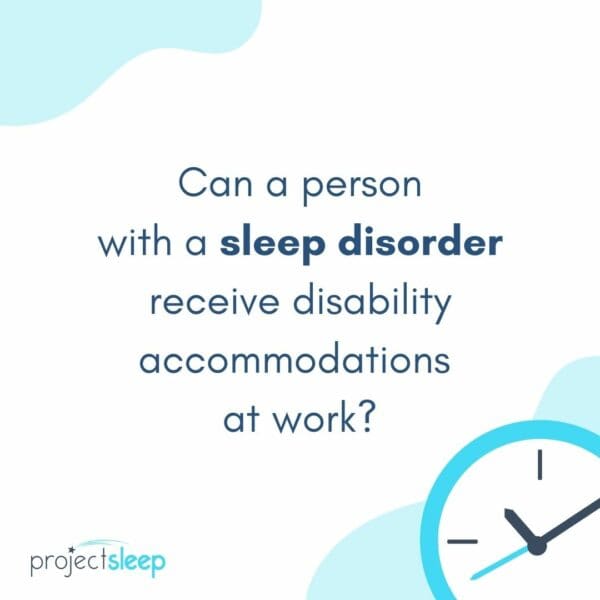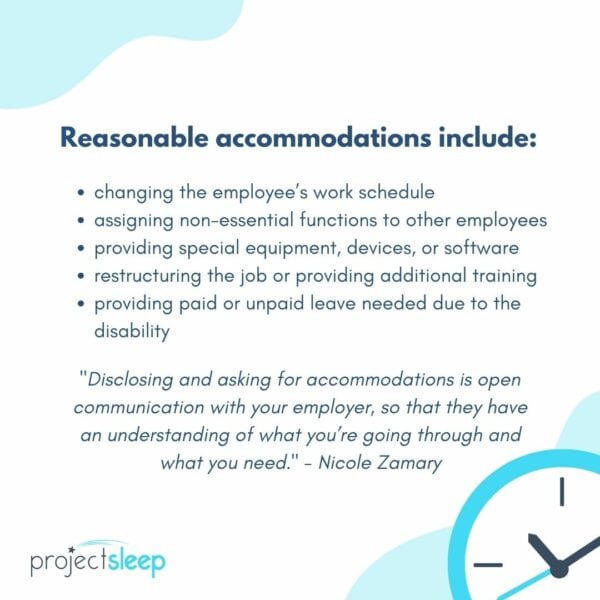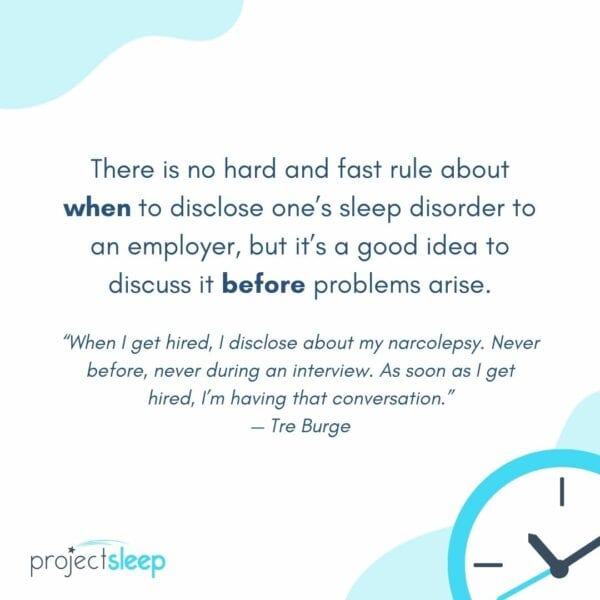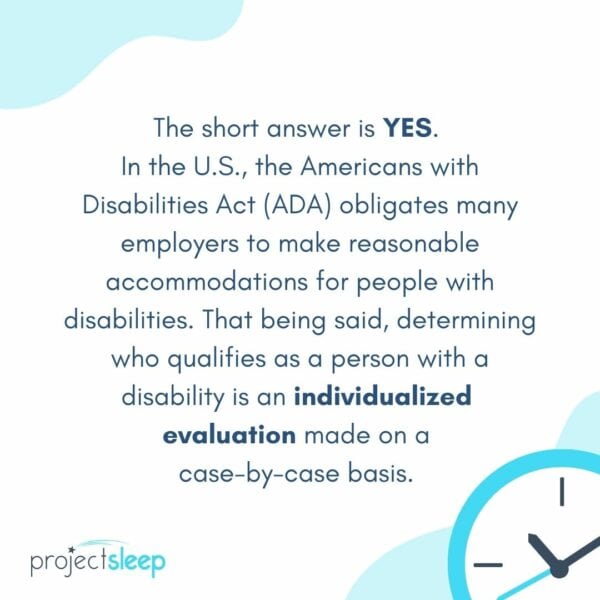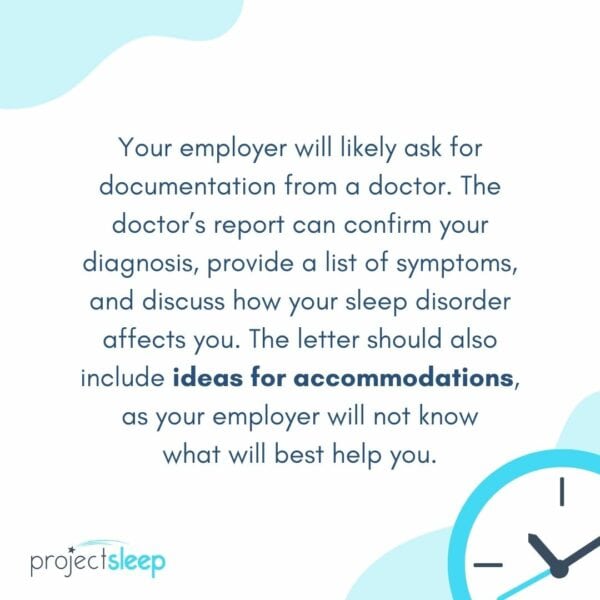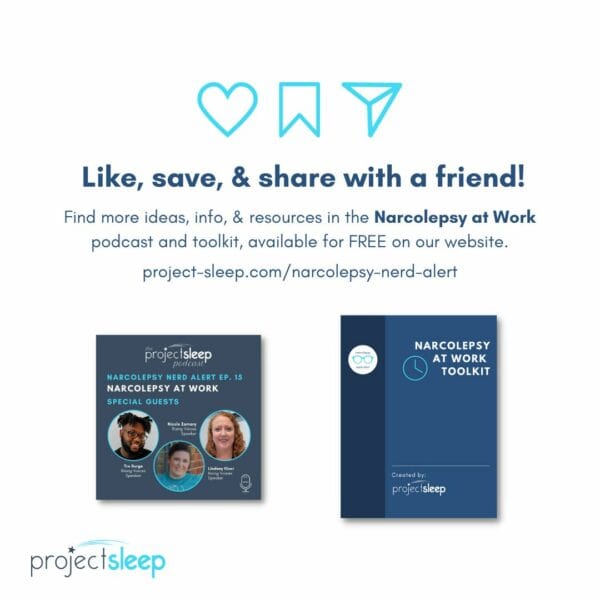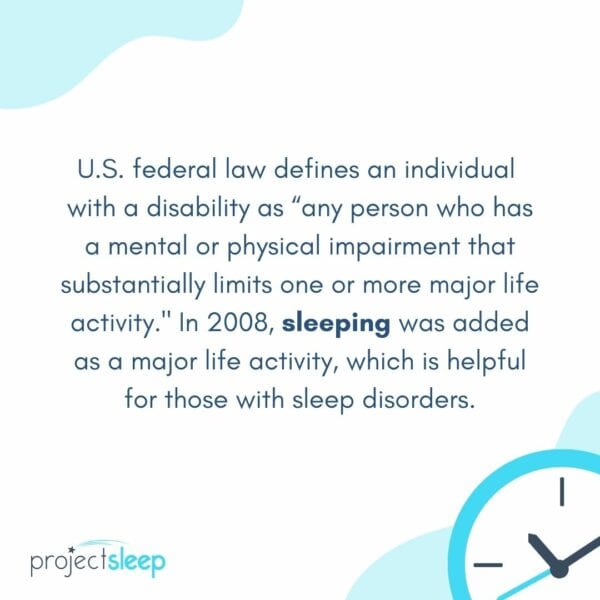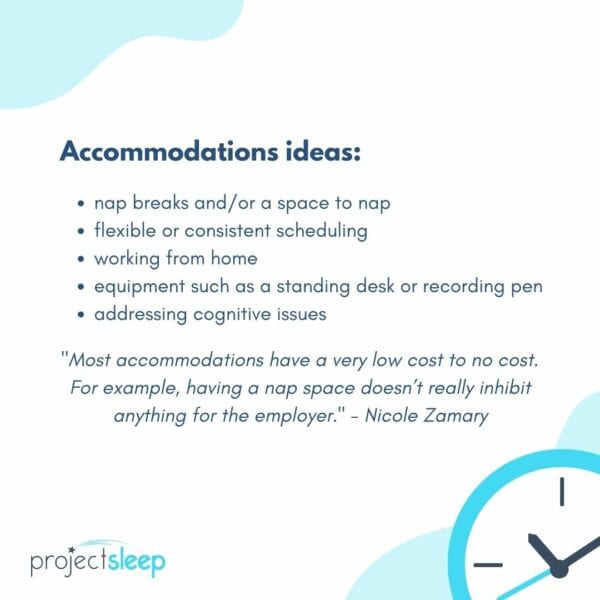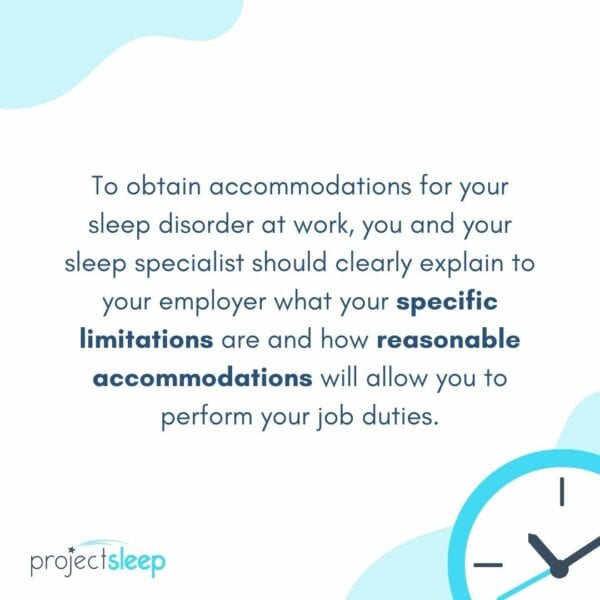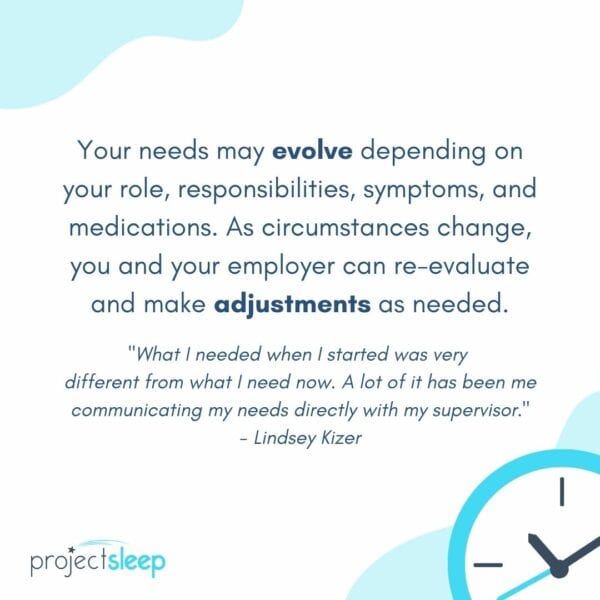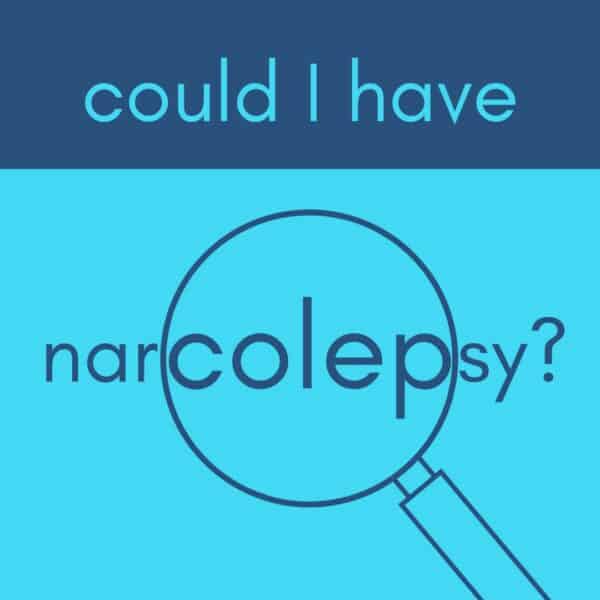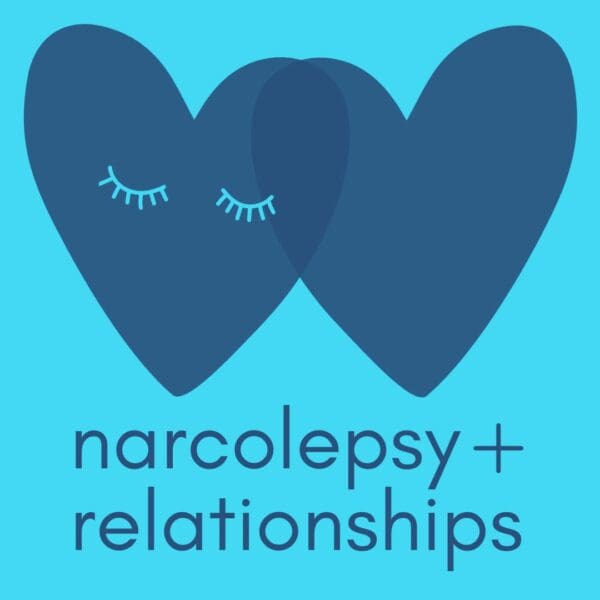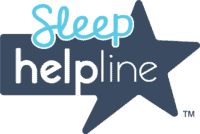Obtaining Sleep Disorder Accommodations at Work
October is National Disability Employment Awareness Month! Project Sleep is proud to share information that may help those living with sleep disorders.
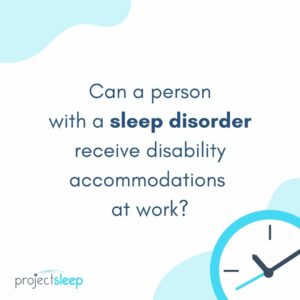
Reasonable accommodations for a disability may help people with sleep disorders succeed at work. Making adjustments for your sleep disorder in the workplace means you’re being smart and strategic; working with your sleep disorder to do your job more effectively and efficiently. Accommodations may help you better manage your sleep disorder’s symptoms so you are able to better showcase your strengths and talents at work.
Disclosing your diagnosis and asking for accommodations — it’s open communication with your employer, so that they have an understanding of what you’re going through and what you need.
— Nicole Zamary, Rising Voices Speaker
Does a Sleep Disorder Qualify as a Disability?
A diagnosis does not, by itself, qualify an individual as having a disability under United States law. In the U.S., determining who qualifies as a person with a disability in a work setting is an individualized evaluation made on a case-by-case basis. U.S. law defines an individual with a disability as “any person who has a mental or physical impairment that substantially limits one or more major life activity.”
Major life activities include caring for oneself, performing manual tasks, walking, seeing, hearing, speaking, breathing, learning, and working. In 2008, new activities were added: eating, sleeping, standing, lifting, bending, reading, concentrating, thinking, and communicating. While a sleep disorder affects many aspects of life, the inclusion of sleeping as a major life activity is helpful for those with sleep disorders to gain a favorable disability determination toward receiving accommodations.
Sleep Disorder Accommodations Process
To obtain sleep disorder accommodations at work, you and your sleep specialist should clearly explain to your employer what your specific limitations are and how reasonable accommodations will allow you to perform your essential job duties. A reasonable accommodation is a change or adjustment that allows a person with a disability to perform the essential duties of a job. This may include:
- changing the employee’s work schedule
- assigning non-essential functions of the job to other employees
- providing special equipment, devices, or software
- restructuring the job
- providing additional training
- providing paid or unpaid leave needed due to the disability
Unreasonable accommodations would be those that would not help the employee perform the essential functions of the job, or would impose a significant financial hardship on the employer.
When you formally disclose to your employer, they will likely ask for documentation from a doctor. The doctor’s report can confirm your diagnosis, provide a list of symptoms, and discuss specific ways that your sleep disorder affects you. The letter should also include ideas for accommodations that you and your doctor have already discussed.
Work Accommodations Examples
Your employer will likely not know what will best help you. You may even be the first person to receive sleep disorder accommodations at work, so it’s important that you bring ideas for accommodations to the table. Sleep disorders affect each person differently, and what works best for you may be a creative combination of tools and strategies, such as:
- nap breaks and/or a space to nap
- flexible or consistent scheduling
- working from home
- equipment such as a standing desk or recording pen
- addressing cognitive issues
Some types of accommodations may not fit for certain jobs. You may want to have backup ideas in case your employer doesn’t approve your initial suggestions for accommodations. For a more detailed list of accommodations ideas, see our Narcolepsy at Work toolkit.
TIP: accommodations should reflect potential needs on your worst day. You may not always need to use them, but it’s better to have a plan before a difficult situation arises. Your needs may also evolve depending on your role, responsibilities, symptoms, and medications. As circumstances change, you and your employer can re-evaluate and make adjustments as needed.
What I needed when I started was very different from what I need now. A lot of it has been me communicating my needs directly with my supervisor.
— Lindsey Kizer, Rising Voices Speaker
When to Disclose Your Sleep Disorder
There is no hard and fast rule about when to disclose one’s sleep disorder to an employer. Potential employers cannot make disability inquiries until after a conditional offer of employment is made. Drug tests and medical exams should only be conducted after the offer of employment is made as well. There are rules about confidentiality.
It’s a good idea to discuss your sleep disorder with an employer before problems arise. For example, many employers may be able to accommodate an employee taking a nap or arranging a more flexible schedule. However, if a sleep disorder affects one’s performance before disclosure, an employer may misinterpret symptoms as laziness, inattentiveness, or poor performance.
It may feel uncomfortable discussing your diagnosis and requesting accommodations. Yet, if your sleep disorder might impact your work, bringing this up is important. In some settings, an informal disclosure may be appropriate after establishing good rapport with an employer.
When I get hired, I disclose about my narcolepsy. Never before, never during an interview. As soon as I get hired, I’m having that conversation.
— Tre Burge, Rising Voices Speaker
How to Disclose Your Sleep Disorder
When disclosing your diagnosis, there are three main points to include for a positive and productive conversation with your supervisor or Human Resources:
- Basic Facts on Your Sleep Disorder: Lack of awareness about sleep disorders and misperceptions may lead to exaggerated concern or lack of concern. Look for resources and fact sheets about your specific sleep disorder to share with your employer.
- How Your Sleep Disorder Affects You: It’s important to clearly communicate how your sleep disorder affects you in order to identify the accommodations that will be most helpful. It’s a good idea to highlight strengths and skills along with the challenges you experience. For example, you might mention you are very organized, which helps you stay on task if you’re having brain fog, or you take excellent notes because you sometimes struggle with memory issues.
- Accommodations Ideas: You and your doctor should have a discussion and prepare a list of specific adjustments that would help you fulfill your essential job duties. Check out our Narcolepsy at Work toolkit for an extended list of example accommodations or search the Job Accommodations Network’s database: https://askjan.org/soar.cfm
Telling Your Co-Workers
Deciding how, when, and with whom you share your diagnosis is a personal decision. Like most people, your co-workers may have misperceptions of sleep disorders or may not know what to ask or say. Remember that you’re the expert on your experience and consider sharing with co-workers as an educational opportunity.
If you choose to share your diagnosis with a colleague, they may be able to help support your experience. For those with supportive employers, the workplace can even be a place for broader sleep disorder education and advocacy.
The Bottom Line: Sleep Disorder Accommodations at Work
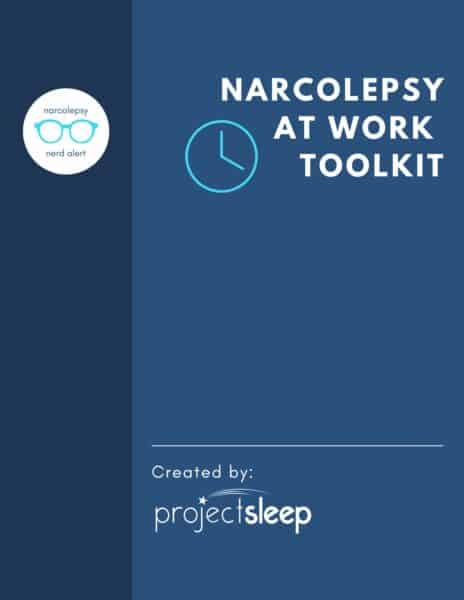
It can take time and effort to gain sleep disorder accommodations at work. Learning about legal protections, the accommodations process and ideas, and how to disclose to your employer and co-workers will empower you, your employer, and your doctor to work together. Perseverance and communication are key!
For more accommodations ideas, resources, information, and sample letters, download our toolkit on receiving accommodations at work: Narcolepsy at Work. While the toolkit specifically addresses narcolepsy, the information and resources provided are applicable to other sleep disorders as well. Please share this resource with employers, loved ones, and health care providers!
Listen to Podcast
Watch Broadcast
Important: Qualifying as having a disability in one area of the law is not a blanket determination applicable to all other areas of the law. This post speaks to U.S. legal protections in the workplace. Other areas of legal protection may consider different factors and reach different conclusions. Please note that this information is shared for educational purposes. Project Sleep cannot provide legal advice.
Social Media Shareables
More From the Narcolepsy Nerd Alert Series
Narcolepsy Nerd Alert: Could I Have Narcolepsy?
Narcolepsy Nerd Alert: Narcolepsy and Relationships






 What I needed when I started was very different from what I need now. A lot of it has been me communicating my needs directly with my supervisor.
What I needed when I started was very different from what I need now. A lot of it has been me communicating my needs directly with my supervisor. When I get hired, I disclose about my narcolepsy. Never before, never during an interview. As soon as I get hired, I’m having that conversation.
When I get hired, I disclose about my narcolepsy. Never before, never during an interview. As soon as I get hired, I’m having that conversation.